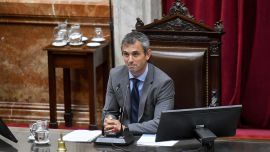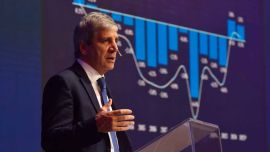“The Peronists aren’t fighting, they are copulating.” Thus, an experienced observer of Argentine politics explained the recent surge in friendly fire among different factions within the ruling Frente de Todos coalition, mainly aimed at the leader of the pan-Peronist grouping, President Alberto Fernández. It may be possible that this level of public aggression among members of the same party, united in a broader coalition — which proves just how ideologically flexible Peronism really is — is absolutely normal, but it is occurring at a moment when generalised tension and anxiety are reaching fever pitch. Facing a global pandemic, one of the worst economic contractions in Argentina’s history and a challenging (and still ongoing) debt restructuring bid, it seems counterproductive to raise doubts about who is in charge, Alberto or his vice-president, Cristina Fernández de Kirchner. Furthermore, it also poses a contradiction regarding Fernández’s socio-economic project – he reached the presidency selling a business-friendly message of unity and consensus-building, but his power-base responds to his veep, who espouses an anti-capitalist ideology and a political construction built on antagonism, with a clearly defined enemy.
It was troubling to see the president make a big effort to justify his policy decisions throughout the past few weeks. This was particularly obvious in his conversation with militant journalist Victor Hugo Morales, who expressed his “disgust” at the country’s public positioning at the United Nations condemning human rights violations in Venezuela and calling for open and free elections. Morales suggested it was a “disenchanting step,” aligning Argentina with UN High Commissioner for Human Rights, former Chilean president Michelle Bachelet, and the United States. Morales, a former football commentator who is remembered for his passionate coverage of Diego Maradona’s two epic goals against England in the 1986 World Cup, became a radicalised Kirchnerite during the second half of the so-called ‘Década Ganada,’ emerging as one of the most prominent supporters of the cause and the battle against perceived enemies, in particular the monopolistic Grupo Clarín. Fernández was forced to clarify that Argentina’s position remained unchanged, in that it rejects foreign intervention in Venezuela but acknowledges human rights violations perpetrated by the Chavista regime led by Nicolás Maduro. Yet, the middle-ground being taken by the Fernández administration on Venezuela is clearly uncomfortable to many who voted for the current administration.
Among the more fundamentalists followers of Fernández de Kirchner there is a vision that the United States is the root of all geopolitical evil, responsible for corrupting Latin America’s elites and encouraging them toward financialisation and capital flight rather than the productive development of their nations. Cristina herself made it clear, with her actions while in office, that she favours an alignment with some of the United States’ major opponents including Venezuela, Iran, and Russia. She has also blamed Washington for being behind a convoluted strategy to imprison Latin America’s leftist populist (“progressive”) leaders dubbed “lawfare.” Alberto Fernández has publicly taken that position himself, in a recent video conference call with former Brazilian president Luiz Inácio Lula da Silva, he reminisced about the Latin American pink tide and blasted the United States for its neo-colonialistic ambitions.
This ideology goes hand-in-hand with the idea that capitalism is deeply flawed. Cristina’s first major stab at the president she picked single-handedly occurred last week, when she tweeted a story written by journalist Alfredo Zaiat in the Página/12 daily, saying she considered it to be “the best analysis I’ve read in a long time.” The piece is deeply critical of Alberto’s inclusion of the so-called ‘G6’ group of leading businessmen at the 9 de Julio Independence Day celebrations and the journalist claims this oligarchy of monopolistic, conservative businessmen, led by Clarín and Paolo Rocca’s Techint, have systematically bet against the construction of a project of national development, instead focusing on withdrawing productive capital from the economy to hide it in tax havens.
Whether or not this vintage anti-capitalist, anti-US ideology is right or wrong — I personally think there are a lot of reasons to believe the United States has a strong geopolitical interest in controlling the region, and that it has global economic leverage that has helped push capitalism into a flawed state that benefits financialisation over the actual generation of productive jobs and/or goods and services — it contradicts the president’s stated position of building a national consensus aimed at putting the country on a sustainable path to longer-term economic growth. This, at least, is what former economy minister Roberto Lavagna said to a very private group of businessmen recently, indicating he wouldn’t even consider being part of the current administration given the level of internal fragmentation and the rising doubts as to who is really calling the shots. Lavagna, one of the protagonists of the Argentine “economic miracle” starting in 2003, indicated they used three tools at the time to drag the country out of the disaster of the 2001-2002 crisis: consensus among major stakeholders, a strong and well-defined economic programme, and a political construction without fissures.
President Fernández committed the original sin of cozying up with all sorts of players that are indigestible for pure Kirchnerites. He has a good relationship with Clarín and its chief executive Héctor Magnetto, he’s built a working relationship with Buenos Aires City Mayor Horacio Rodríguez Larreta and some of the opposing lawmakers grouped in the Juntos por el Cambio coalition, while seeking to garner the support of the business establishment. In every major speech, Fernández has preached about unity and the need to go beyond “la grieta.” But, as the coronavirus pandemic recedes to the background, the “grieta” is again coming to the fore, at the centre of political debate. Is it possible to build a unity government with this level of internal aggression, and with Cristina as the major power broker within your leading coalition? How comfortable is Alberto Fernández with the voracity with which his leadership is being questioned? And how much will the opposition seek to gain political advantage from the situation? These are the underlying questions that emerge once Peronists “copulate.”


















Comments